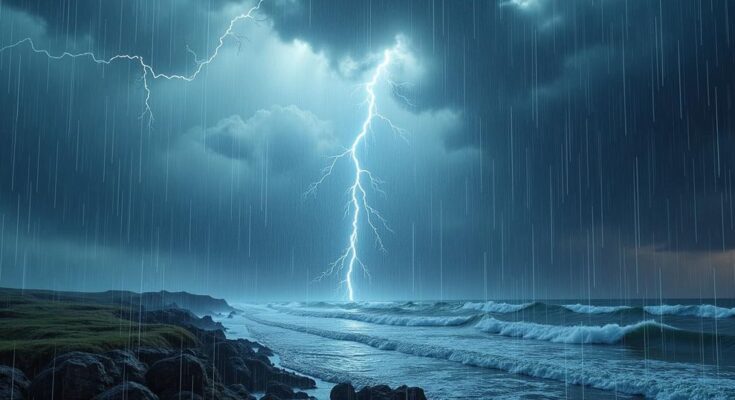A study from World Weather Attribution indicates that climate change exacerbated the intensity of Hurricane Helene, increasing rainfall by 10% and wind speeds by 11%. This has implications for future storms, including Hurricane Milton, which is expected to similarly impact Florida’s coast. Climate change is linked to higher sea temperatures, resulting in more severe inland flooding and higher risks of hurricanes than previously recorded.
Recent studies indicate that human-induced climate change significantly amplified the impact of Hurricane Helene, increasing its rainfall by approximately 10% and its wind speeds by 11%. This conclusion comes from research conducted by World Weather Attribution (WWA), which noted that ocean temperatures in the Gulf of Mexico were 3.6 degrees Fahrenheit (2 degrees Celsius) above average, contributing to a higher incidence of storms like Helene. Helene, which struck Florida with record-breaking storm surges and sustained winds of 140 miles per hour (225.31 kilometers per hour), resulted in over 230 fatalities and left millions without power and essential services. The scientists caution that the ongoing emissions of fossil fuels are likely to yield more intense hurricanes, similar to Helene, which could result in severe inland flooding. The two storms, Helene and the forthcoming Hurricane Milton, exemplify the potential for climate change to exacerbate natural disasters, as they emphasize the need for urgent preparedness and resilience strategies in the face of escalating climate threats. WWA’s analysis illustrates that hurricanes of Helene’s caliber, once expected to occur every 130 years, are now believed to be 2.5 times more likely in the current climatic context. Furthermore, additional research corroborates that climate change has made rainfall rates in affected areas up to 20 times more likely. These findings underscore the reality that increased sea temperatures and changing weather patterns connected to climate change are fostering more severe weather events, accentuating the importance of reducing reliance on fossil fuels and enhancing emergency response systems.
The escalating effects of climate change on hurricanes have garnered significant attention from scientists and researchers. Recent incidents, including Hurricane Helene, have raised concerns about the relationship between human activities—most notably fossil fuel consumption—and the increasing intensity of storms. Studies suggest that the warming climate not only makes hurricanes more frequent but also enhances their severity, impacting rainfall volume and wind strength. The alarming trends highlighted by these studies demonstrate an urgent need to address the ongoing climate crisis through sustainable practices and strategies to mitigate the ramifications of future storms.
In summary, recent analyses reveal that climate change is significantly amplifying the severity of hurricanes, as evidenced by the cases of Hurricane Helene and the impending Hurricane Milton. The increase in rainfall and wind speeds associated with these storms can be attributed to elevated ocean temperatures, which are further influenced by human activities. The findings emphasize the necessity for immediate action to reduce fossil fuel dependence and to enhance disaster preparedness protocols to safeguard vulnerable communities from unprecedented natural disasters driven by climate change.
Original Source: www.mychamplainvalley.com




